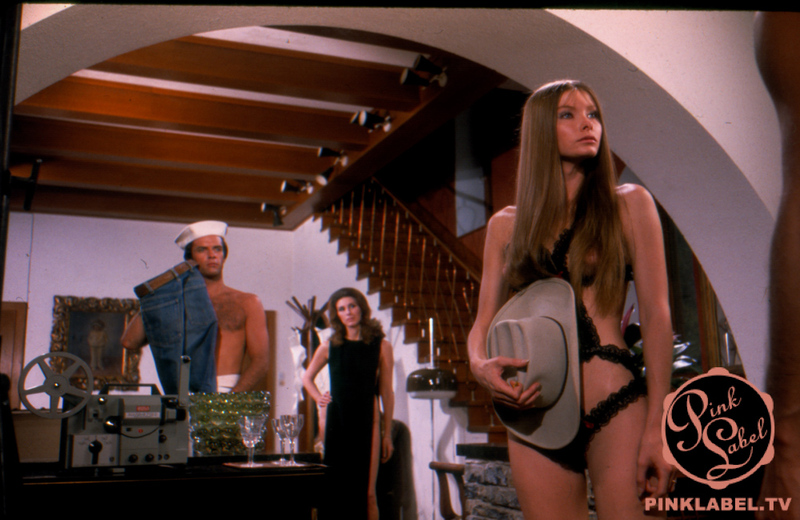
REVIEW
Score
Genre: Classics, Comedy, Drama
Year Released: 1974, PinkLabel.TV 2018
Runtime: 1h 32m
Director(s): Radley Metzger
Writer(s): Jerry Douglas
Cast: Cal Culver, Claire Wilbur, Gerald Grant, Lynn Lowry
Where to Watch: Available now. Stream here: www.pinklabel.tv
RAVING REVIEW: Sometimes, a film doesn’t break the rules so much as it rewrites them with a smile and a nod. SCORE doesn’t need to make grand statements or shock you into attention—it glides into your line of sight with the confidence of a movie that understands its audience and isn’t afraid to lean into provocation while pulling off something much trickier: humor with edge, sex with structure, and style with substance. It’s not trying to fool anyone with faux gravity, but that doesn’t mean it lacks a point of view. What begins as a breezy sex comedy unfolds into a deliberate, character-driven exploration of seduction and self-discovery.
Under the direction of Radley Metzger, SCORE shifts from its origins to a sun-soaked fantasy town with a flair for mischief. The film lets its characters stretch out and indulge by trading the claustrophobic confines of a play’s single set for open-air balconies and dreamy bedrooms. The premise is deceptively simple: Jack and Elvira, a couple with a long track record in pushing sexual boundaries, set their sights on another couple—Eddie and Betsy. What they’re wagering isn’t just who can get who into bed but how far everyone’s willing to go once the masks drop.
While the camera lingers on flesh and desire, the character dynamics make things interesting. Jack and Elvira’s relationship thrives on conquest, but there’s something off in their interactions—something brittle under the surface. Gerald Grant, playing Jack, wears confidence like a tailored jacket, but there’s a strange detachment behind the smile. Claire Wilbur’s Elvira is a more compelling force: a seductive strategist who knows her power and enjoys watching others realize it, too. Her scenes with Betsy edge with an aura beyond flirtation—they play like chess moves in a larger game.
Betsy and Eddie arrive as blank slates—two characters presented as traditional but far from fixed. Calvin Culver’s Eddie is all nervous glances and hesitation, barely containing impulses he doesn’t fully understand. His journey is quiet but charged, particularly in how he responds to Jack’s increasingly intimate overtures. Lynn Lowry, as Betsy, gives what might be the most layered performance in the film. At first, her soft-spoken uncertainty seems like innocence, but as the evening progresses, she emerges with agency, sharpness, and complexity. She doesn’t just respond to Elvira—she challenges her.
What helps elevate SCORE is Metzger’s attention to visuals. He doesn’t shoot these scenes with blunt force. Instead, he slows down time, allowing gazes and touches to play out in mirrored rooms, carefully dressed sets, and teasing glances. Mirrors, in particular, serve as more than decoration—they’re extensions of the characters, reflecting both the seen and the hidden.
When it comes to the actual erotic content, SCORE surprises again. It’s never wall-to-wall scenes of sex. Instead, Metzger holds back. The major sequences, particularly a moment that cuts between a male and female pairing in separate locations, are designed to show symmetry rather than hierarchy. The queer representation is not presented as shock value or comic relief—it’s central, treated with as much cinematic care as any heterosexual exchange. That balance feels particularly ahead of its time.
SCORE isn’t perfect. The internal tensions between Jack and Elvira hint at deeper, unresolved conflicts that aren’t fully explored. There was an opportunity here for an emotional reckoning, mostly sidelined in favor of the seduction plot. That said, it’s a rare film that even reaches for those layers, and the fact that it looks toward them at all sets it apart.
Metzger doesn’t build stories around shame. His interest lies in permission—what people can feel, explore, and desire. SCORE succeeds because it encourages its characters to lean into uncertainty without punishment. It doesn’t lecture or romanticize; it stages identity as a moving target, not a static label.
What could’ve easily been another stylized test turns into a sly, smart provocation. SCORE may not announce itself as a revolution, but how it normalizes fluidity and centers pleasure without trivializing it feels radical even today. It invites the audience to ask better questions—not just about who people are attracted to but why it’s often hard to admit what we want.
I’m always happy to hear from my readers; please say hi or send me any questions!
[photo courtesy of PINKLABEL.TV, CULT EPICS]
DISCLAIMER:
At Red Light Rated, we are committed to transparency and honest reviews. Occasionally, we receive free access to certain websites to provide in-depth evaluations, but this does not influence our opinions. We always prioritize fair, unbiased, and insightful assessments to help you make informed decisions. Additionally, some links in our reviews are affiliate links, meaning we may earn a small commission if you sign up through them at no extra cost.




